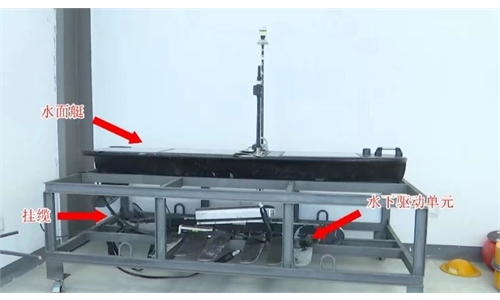National security officers at forefront of maritime security share stories on occasion of Chinese People's Police Day

National security officers pay tribute at the memorial wall to unsung heroes. Photo: You An
China's coastline spans over 32,000 kilometers, encompassing extensive maritime strategic interests. The vast ocean provides opportunities to expedite the construction of a strong maritime country, yet it also poses risks and hidden dangers in areas such as national security, military security, deep-sea security and ecological security.
Currently, China's maritime security has grown increasingly complex, with numerous instances of foreign espionage targeting coastal areas. In recent years, national security agencies have disclosed cases including "foreign-funded environmental organization illegally collecting marine data" and "sea cucumber farmer uncovering espionage equipment for stealing military intelligence," underscoring the growing need to strengthen maritime security measures.
Personnel from national security agencies are vital guardians of China's maritime territory. However, due to their unique functions, status and missions, stories from the covert frontlines often remain unknown.
Before the fifth Chinese People's Police Day on January 10, Global Times reporters visited coastal regions such as East China's Fujian Province, South China's Guangxi Zhuang Autonomous Region, East China's Zhejiang and Jiangsu provinces to conduct in-depth interviews with local national security personnel about their experiences in safeguarding national and maritime security.
'If I'd fallen in, the boats hit each other, I would've been squashed'
As the clock struck midnight, national security officers Su Yanbin and his colleagues quickly departed from a port in Fujian on a fishing boat, to address a hostile situation at sea that threatened national security.
Long hours at sea present a considerable physical challenge for the officers. In storms with winds reaching eight or nine degrees and waves exceeding 10 meters, even seasoned fishermen find it difficult to avoid vomiting. After being sick, they must push themselves to eat to sustain their strength. This cycle of eating and vomiting is something the officers must endure.
The risks associated with maritime tasks can arise unexpectedly. On one occasion, while Su's colleague was transporting equipment weighing over 50 kilograms from the small boat to the larger vessel, a wave suddenly caused the two boats to separate.
With one foot on each side, he was nearly pulled into a split position. Fortunately, a colleague behind him gave him a strong push onto the larger vessel. "That was too dangerous. If I had fallen into the sea and the boats hit each other, I would have been squashed between them," Su recalled.
Despite the challenges posed by the demanding task, the determination of the police officers to protect national security remains unwavering. Their experience continues to grow, and advancements in technology have significantly strengthened the safeguarding of national security in the coastal areas.
Jointly safeguard our hometown
A villager, surnamed Hu, is a native islander, and his hometown is located on an island in southern Guangxi. This place is not only a well-known tourist destination but also a key target of interest for foreign espionage and intelligence agencies.
One day in 2022, Hu noticed that an engineering team had unexpectedly arrived at the village. They enthusiastically claimed that the rural road leading to a sensitive area lacked streetlights and offered to install them for free. "Why do they specifically want to install streetlights on this road?" This raised Hu's suspicions. He quickly reported the situation to the national security authorities and cooperated with them to address the issue, successfully eliminating the potential threat.
The local villagers' vigilance was not without reason. In 2021, national security authorities revealed that a domestic environmental organization received funding from an overseas non-governmental organization. This organization set up marine debris monitoring points within China to collect sensitive data, including marine monitoring information, which was then provided to foreign entities.
Before being dealt with by national security authorities in accordance with the law, this organization had set up numerous monitoring points in dozens of coastal cities across the country, including the island where Hu's hometown is located.
A police officer, surnamed Nong, from the national security agency, was involved in the investigation and resolution of the case. He noted that in recent years, some non-governmental organizations have been collecting sensitive data in China's coastal areas under the pretext of environmental protection and scientific research. Many of these monitoring points are situated near military targets, posing a direct threat to national security.
"The area may be small, but we cannot afford to be careless," Nong said. To strengthen the frontline defense for safeguarding the security of the oceans and islands, law enforcement personnel have been visiting various islands to conduct research on local conditions. They also engage with local communities, going door to door to tighten the "safety net," Nong added.
Every year during the fishing moratorium, officers conduct national security campaigns to fishermen on every fishing boat. They share real cases of fishermen making significant contributions to national security, aiming to inspire patriotism and raise awareness of national security among the fishermen.
Wherever the officers go, national security awareness campaigns are conducted, and the people's line of defense for safeguarding national security is established. Since the first National Security Education Day on April 15, 2016, the entire society has become more actively involved in various efforts to protect national security.
Dongxing in Guangxi is situated at China's mainland coastline and is one of the main settlements of the Jing ethnic group, the only maritime ethnic group in China.
National security officer Huang is from the Jing ethnic group. One of his main responsibilities is to leverage his minority background to promote national security efforts among the local community. At the Jing Ethnic School in Dongxing, Huang and his colleagues regularly conduct classes on national security knowledge, teaching children about the importance of safeguarding national security. "This is a soft yet impactful endeavor. Children should understand from a young age that protecting national security is everyone's responsibility."
Huang's efforts began to bear fruit not long after. The father of a Jing ethnic student, who is a fisherman, discovered suspicious floating objects while out at sea. He immediately recalled the national security knowledge his child had shared at home and promptly called the reporting hotline to provide information, assisting national security authorities in retrieving the floating object. It was later identified as an underwater espionage device deployed from abroad.
Dongxing is also the only place in China with a marine boundary stone. Standing in the vast sea, it represents the nation's territorial limits and symbolizes national security. Thanks to Huang's efforts, the school established the "red scarf" boundary stone protection team. The children climbed onto the base of the boundary stone, where they could only stand, and painted it red. Under Huang's guidance, they saluted the boundary stone.
At this moment, despite being young and inexperienced, the children and Huang had the same thought welling up in their hearts: "This is my hometown, my country, I want to guard it forever."
Continue the path my father left unfinished
After receiving his first third-class merits, Liu Jian, an officer from the Zhejiang provincial national security agency, placed his medal next to the medals his father had earned during his lifetime.
His father was a martyr who sacrificed his life on a covert front. Liu's last memory of him is from a night many years ago. It was very dark, and a dim yellow light hung above the garage door at their unit. Liu sat on the crossbar of his father's bicycle, watching him methodically load goods onto the vehicle. Everyone believed that his father's business trip the next day would be just like any other. Although they didn't know when he would return, they were certain he would come home as soon as he completed his work.
But when Liu saw his father again, it was in a black box. People told him that his father was inside. His mother, grandparents and his father's comrades all cried, leaving the 8-year-old Liu feeling lost and confused.
At his father's funeral, the white wreaths, black mourning ribbons, and solemn crowd made Liu understand for the first time what it meant to be a "martyr" and to "sacrifice." He also realized that the father who used to ride him to and from school on his bicycle and listened to him recount every little thing that happened at school would never return.
Liu knew that his father was a police officer, but his father never talked to him about his work, and he didn't understand what "national security work" entailed. However, after graduating from university, Liu chose to apply to the national security agency and ultimately followed the same path. It seemed that through his father's unfinished career, the two men could engage in a dialogue that transcended time and space.
Shortly after becoming a national security officer, Liu took on a particular assignment. From then on, the lights in his office would only go out after 2 am each day.
Even on weekends, he would immerse himself in the data room, sifting through hundreds of gigabytes of computer materials in search of clues. Day after day, after countless dead ends, the case finally began to take shape. This time, Liu proudly wore the medal for his first personal third-class merit citation on his chest.
Now, Liu Jian has been awarded the third-class merit citation three times and has been recognized as an excellent member of the Communist Party of China twice. "If I have achieved some success, it is not just my own. My father is watching over me, urging me on and walking alongside me," Liu said.
Liu said that even today, his father remains a benchmark for him in his work. Whenever he encounters difficulties, he often finds himself wondering if his father faced similar challenges and how he would have handled them. The lessons his father didn't have the chance to teach him and the words he didn't get to say have undoubtedly been ingrained in his heart over the years and will continue to guide him in future tasks.
Currently, the connotation and extension of national security in China are richer than at any time in history. The spatial and temporal dimensions are broader than ever before, and the internal and external factors are more complex than ever. The challenges faced in maintaining national security are unprecedented.
"I am not fighting alone." Liu and his father, representing two generations, share a mission that transcends history. In the most straightforward way, they convey to their comrades: "We stand in places unseen by the people, but it is precisely where the country needs us most."


